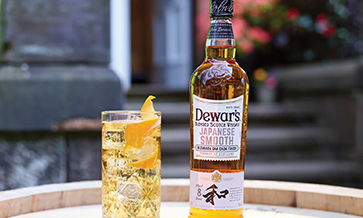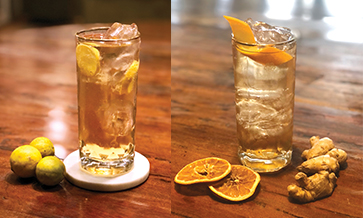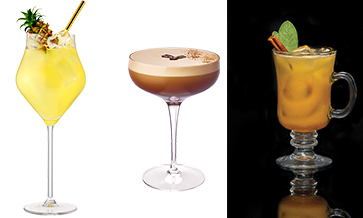For the uninitiated the difference between a craft beer (small batch size) and mass-produced bottled beer is similar to the difference between a gourmet burger and a fast food chain burger. In short, the difference is in the quality of ingredients used. In a gourmet burger, the quality of ingredients would not be compromised.
In craft beer too the quality of ingredients is of upmost importance and the final product will speak volumes about it. But there is a line of caution – not all craft beers are good, and not all bottled mass-produced bottled beers are undrinkable.
When using natural ingredients the extracted flavours would be subtle; but sometimes brewers cross the line and add artificial flavouring (such as mango extracts) and colour (such as the green of apple beer) to a beer, which reflects poorly on the final product. To add any artificial flavour extracts and colours is a big ‘No’ in craft beer culture.
The 2-day brewing boot camp was held at Independence Brewing Company in Pune in May 2019. This was the fourth year of the boot camp, which saw a full strength of 25 attendees with background as varied as information technology, food technologist, lawyers, bloggers and microbrewery founders coming from Pune, Bengaluru, Goa, Mumbai and Delhi.
“Boot camp 004 was an amazing experience. Two days filled with learning a lot about beer: facts, figures and brewing science. I enjoyed the brilliant in-house brews at Independence Brewing, and shared a special time out there with the rest of the participants,” said Elroy, who works as software developer in Bengaluru.
Good beer
Shailendra Bist, head brewer, spearheaded the programme along with his core brewing team of seven. Shailendra, aka Shailly, a mechanical engineer, co-founded Independence Brewing Co after moving back to India from USA in 2012. He picked up home brewing as a hobby while in California, and there was no turning back since then.
He is also a member of the BJCP (Beer Judge Certification programme). Independence Brewing Co. was established in 2014 in Mundhwa (Pune) followed by a tap room in Balewadi (Pune) and Mumbai (Andheri West).
“Our intention was simple: get craft beer enthusiasts together and have fun learning together about how it’s actually made. We just do our bit in educating the end consumer more and also in return get inspired by their enthusiasm!” says Shaily.
It also helps him build a community, step by step. “Good beer cannot exist without its patrons. In return we churn out beers that they can get excited about,” he added.
The focus of Day-1 was brewing basics, understanding the ingredients, guided beer tasting, and knowing the common beer flaws. The next day was dedicated to the recipe formulation and brewing process. Brew day was much more relaxed; and everyone got a sneak preview of a day in a brewer’s life.
Inspired recipe
This was the first time that Shailly decided to brew a pale lager as boot camp beer project. “It’s a weather-inspired beer recipe,” he stated and explained that Pilsner or lager has a clean malt profile and it’s crisp and easy drinking suitable for summers
To satiate his hop hunger he drew inspiration from pale ale which has a good balance of malt and hops. He explained, “To brew a pale lager is marrying two styles: lager plus pale ale. But one must keep in mind that the hops should not overwhelm the malt character and should not impart too much bitterness.”
Shailly has been brewing in Pune for the last 5 years and is well accustomed to his brewing system efficiency, raw material and yeast performance. Based on the this, and the targeted style, the formulated (basic maths!) recipe for brewing a 1,000-litre batch is: 205 kg malt (190 kg pilsner, aka base malt) and 15 kg of specialty (crystal) malt to aid some underlying malt sweetness and gold colour.
Mangum hops for bittering at the whirlpool stage (>80 degree C) and Amarillo hops addition for dry hopping (post wort fermentation) to impart citrus and orange notes to the final beer.
The water chemistry was unchanged as the Pune water profile (soft) is perfect to brew a lager or pilsner. The beer is aptly named Bootcamp Lager and was available on Independence brewery (and taprooms in Mumbai and Pune) from 28 May.
For beer nerds the takeaway from the boot camp can be summarised as:
- To formulate a recipe, a brewer must always choose a reference point; starting from the closest classical style of beer to his/her own targeted style. This will define the reference beer parameters, also called baseline parameters.
- The next task is to tweak the recipe to match your preferred style and that melts down to two points a) what beer baseline parameters to change, and b) changes in ingredients to mirror the desired style.
- Knowing raw material, the overall system and process efficiency will help a brewer to zero down to his/her targeted beer style.
This is a unique boot camp where not only is knowledge shared but a well implemented brewing culture is promoted among likeminded folk.
Last but not the least, it’s a one-of-its-kind workshop in India, and of the best possible ways a microbrewery can amass a fan base. Down the line I would not be surprised to see this boot camp transforming into a certified brewers’ programme, running for a week or so.














